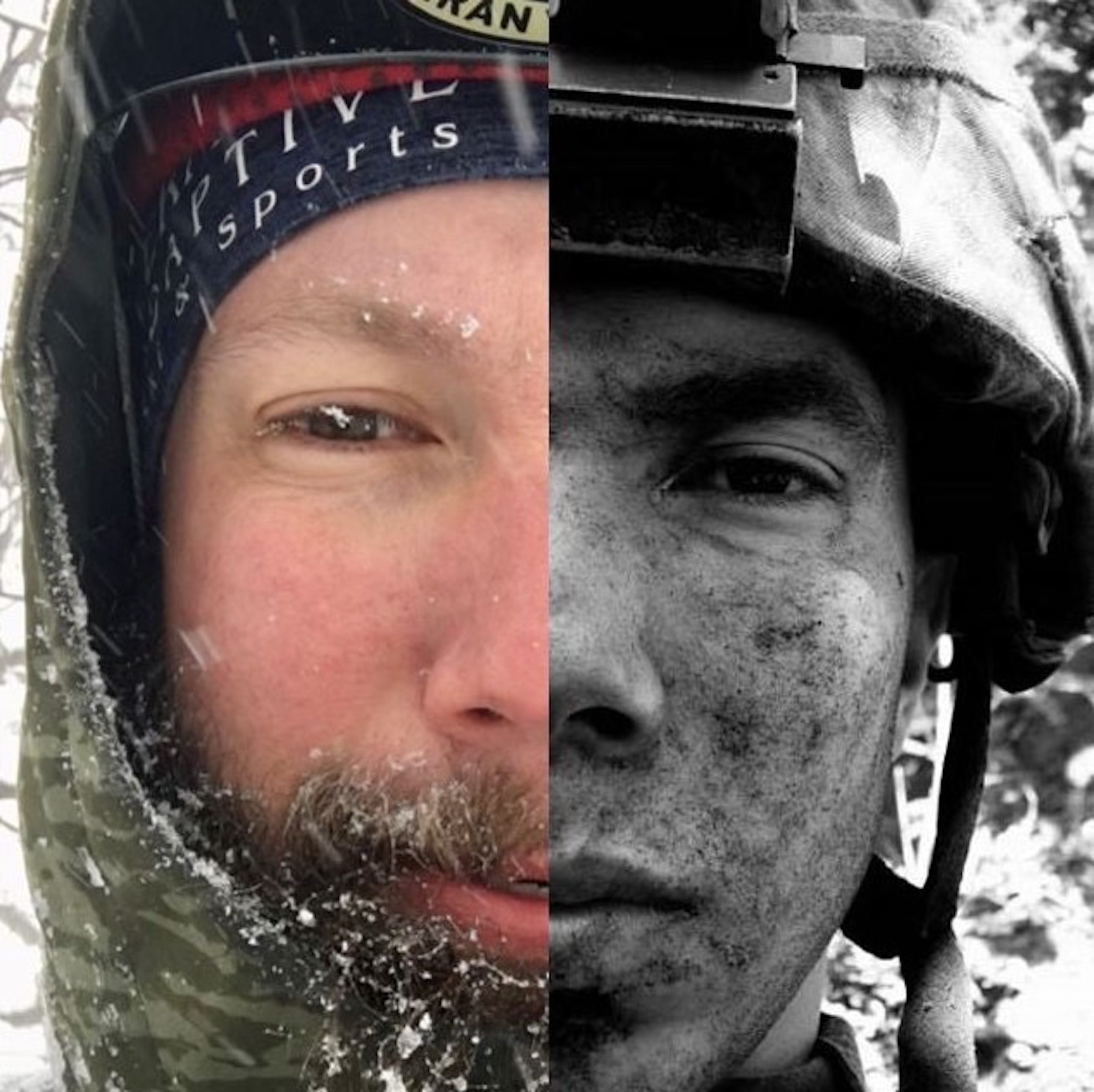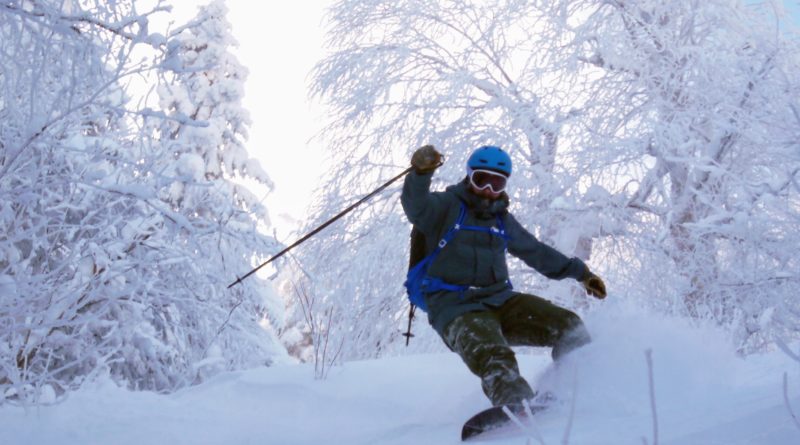After the War, A New Mission
To many of the people who walk into Vermont Adaptive’s Sugarbush facility, Misha Pemble-Belkin is the snowboarder with the beanie and long beard who helped launch, and now runs, the organization’s veterans’ program.
To others who see him from the lift or spy him in the backcountry at Bolton Valley, he’s the guy who snowboards with one ski pole. “I get heckled for that sometimes by other snowboarders,” he says. “Most people don’t know my story,” he says. “I don’t really tell it very often,” he adds, shyly.
It is quite a story.
At first glance, there is little in his gentle demeanor that indicates that Staff Sargent Misha Pemba-Belkin, now 36, fought in some of the deadliest war zones in Afghanistan.
Pemble-Belkin did two tours establishing and defending U.S. outposts along the knife-edge mountain ridges of the Kunar Province where the mountains rise to 16,000 feet. “Nearly every day we were moving up or down at least 1,000 feet with our Restrepo outpost at 6,000 feet of elevation,” he says of his first deployment in the Korengal Valley. “We put on 35 pounds of body armor, a helmet that weighed 10 lbs. and then a standard combat load of 210 rounds of 556 ammo, plus water and food. I was a grenadier, so I had grenades on me, too,” he recalls. All in all, he estimates he was carrying about 70 to 150 lbs. a day, while dodging bullets as Taliban and Al Qaeda fighters sniped at the Americans from the hillsides.
“I saved a few lives on that first deployment,” says Pemble-Belkin, who was 20 when he joined the Army. But others were killed by enemy fire, including three of his friends; fellow soldiers Timothy Vimoto, medic, Juan “Doc” Restrepo, for whom the platoon named their outpost and Ssg. Larry Rougle.
Sebastian Junger, the award-winning author of The Perfect Storm and other books embedded five times with Pemble-Belkin’s unit, the 173rd Airborne Brigade’s Battle Company, between 2007 and 2008. Junger and photographer Tim Hetherington would go on to cover Pemble-Belkin and the troop in a story for Vanity Fair. They later made a documentary, Restrepo that was nominated for an Oscar for Best Documentary in 2010 and Junger published the book War, on which it was based. Pemble, who was featured in the film walked the red carpet with the filmmakers at the Oscars. He is still friends with Junger. Hetherington was killed by mortar shrapnel in 2011 while covering the civil war in Libya.
After his first tour ended in 2008, Pemble-Belkin returned to Oregon. But memories of the Kornegal Valley tugged at him. “I saw all the good that was being done in Afghanistan at the time and I wanted to go back and help,” he says. He reenlisted and at first was put in charge of training younger recruits. Then he asked to be assigned to a unit that would deploy to Kunar Province.
Pemble-Belkin had been in Afghanistan about three months when he was caught in a recoilless rocket attack. A rocket exploded through the roof of his building. “When you are in a building, the shock wave just bounces off the walls and sometimes it intensifies so you feel like you are being hit six, seven, eight nine times all at once,” he says. Pemble-Belkin ended up with damage to his cervical spine and a traumatic brain injury. A soldier near him had his knee-cap blown off.
Though he could have gone home on medical leave, Pemble-Belkin asked to stay in Afghanistan and finish out his deployment. But when he got back to the U.S. base in Hawaii and tried to retrain, he found he was “permanently broken,” he says. He was told he had three options: continue as a paratrooper and further damage his body and risk becoming a paraplegic, take a desk job or retire. He took medical retirement.
 Finding Purpose
Finding Purpose
What people who come to Vermont Adaptive do know is that Misha Pemble-Belkin is quiet, and patient and intensely focused on helping other veterans; For some, it is healing their bodies, for others, their minds. “For some veterans, sometimes it’s simply making sure they have a roof over their heads and connecting them with the help they need,” he says. “It’s easy as a veteran to go off the grid.”
Go off the grid. That’s what Pemble-Belkin thought he would do when he moved to Vermont after leaving the Army in 2015. “My town in Oregon, Hillsboro, had grown from 30,000 to (112,000)230,000 people. I knew Vermont a little bit, my ex-wife and I had been here. I knew there were like five ski areas near where I would live. There’s lakes, there’s wilderness, there’s land and my goal was to fall off the grid and get isolated,” he says. He bought a house in Essex on 10 acres that he still heats solely with firewood that he cuts and hauls. When he first moved to Vermont he worked at Lowe’s and as an apple picker. In addition to his physical injuries, PTSD, anxiety and depression haunted him. Simply finding passion and purpose was difficult.
“I got through it by giving myself really simple goals,” he says. “Some days, it was just doing the dishes. Other days, the goal was to just step out on the porch and be outside,” Eventually, he connected with one of the Army’s peer support specialists who had known his platoon sergeant from the first deployment. “He pitched Vermont Adaptive, which was trying to get a veterans program going — that was in 2016.” The plan was to meet at Vermont Adaptive’s Bolton Valley base once a week.
Though he loved to snowboard, Pemble-Belkin wasn’t quite ready for a formal program. “I was cranky at the time. You get institutionalized in the military –it’s your whole life – so reintegration is not easy. I was a paratrooper —what does that transition to in civilian life? So, I went up to Bolton a couple of times and thought, ok, that’s cool.”
Vermont Adaptive mentored Pemble-Belkin, made sure he could snowboard on his own (because of his injuries, he uses a ski pole to balance and to help him get up out of the snow) and then gave him a pass anytime he wanted to ride at Bolton. “That first year, I pretty much just rode alone,” he says.
As a kid in Oregon, Pemble-had been a strong snowboarder. At 15, he and a friend had summited and then snowboarded down 11,249-foot Mt. Hood in a day. “We didn’t have any of the gear then, so we just made our own ice axes and brought just regular ropes,” he said.
The next summer, he started to participate in a few other Vermont Adaptive programs. “I thought ‘This is nice what they are doing’ and I started to volunteer a bit,” he remembers. At the time, he was getting his college degree at Community College of Vermont and discovered he could do an internship at Vermont Adaptive.
Vermont Adaptive had always served veterans but not with a formal program. “The first year we had a weekly program with 36 vets,” Pemble-Belkin recalls. “The next year it was 78 then the next year, 108, then it kept growing by 50 percent.”
The internship grew into a contract position, then a salaried job running the veterans’ programs. “Vermont Adaptive works around my disabilities, which is really nice. They understand if I need to take time some days,” says Pemble-Belkin. “I have PTSD, anxiety and about 23 different things on my body that the VA rated as broken –something wrong with me from my time in the service.”
Climbing Back
On a Friday in February, Pemble-Belkin goes ice climbing near Killington with his wife, Allie, and another vet. Pemble-Belkin has trouble raising his arm above a plane and his cervical injury – discs that bulge forward in his neck — makes it hard to lift his head to look up. “You find ways to adapt and to prove to yourself you can do this,” he says. When he snowboards, he uses the ski pole for balance, the same way a tight rope walker would.
Pemble-Belkin first got into ice climbing in 2017 when he pulled a group of six or seven vets together to participate in Ice Bash at Smuggler’s Notch. There, he met another veteran, Alex Sargent of Sunrise Mountain Guides. “Since then, Sunrise Mountain Guides has donated over $10,000 of climbs to us every year,” says Pemble-Belkin. Sargent has remained a friend and climbing mentor.
There are about 37,000 vets in Vermont and since 2017, Pemble-Belkin estimates that since he joined Vermont Adaptive’s staff in 2017, they have served more than 400, with about 5,000 activities. All activities are free to participants; Vermont Adaptive’s $150,000 budget for the veterans program comes largely through donations, with some grants.
In 2018, the Veterans Administration reached out to see if Vermont Adaptive could do something to honor women vets. The retreat has since grown into an annual event, held on March 8, International Women’s Day. This March, Pemble-Belkin is bringing a group of 12 women to Sugarbush for four days (all expenses covered) of skiing, snowboarding and ice climbing.
“One year we were doing the retreat at Pico and a woman showed up using a walker. She had been diagnosed with MS and started shaking her head before the retreat even started, saying it was too much for her and she was going to leave,” Pemble-Belkin recalls. By the end of the day, she had done four ski runs. “Her perception of her ability levels changed, and she proved to herself she could still do stuff,” he says. “After a traumatic event happens and you are no longer able to do what you used to, some people tend to give up,” he notes. “But you don’t have to. There are ways to adapt.”
For Belkin-Pemble, there are so many ways that outdoor recreation can help people heal. “You get that state of flow from going down the mountain, then bullshitting with someone on the chairlift on the way up, and then riding down the mountain again. You get vitamin D exposure from being in the sun and when you go into evergreen forests you breathe easier,” he says. But most of all, what Vermont Adaptive has brought him is a renewed sense of passion and purpose.
“When I signed up for the military, I initially signed up for four years but If I had reenlisted yet again, I would have put in 20 years of service to my country. But when you’re out, all of a sudden you lose that sense of passion and purpose,” he says. “I did nine years in the military and if I can fulfill 20 years of service by doing what I’m doing with Vermont Adaptive—with my mental health the way it is, and my disabilities and everything like that— I’d be really proud of myself,” he says. The good news? He has five more years to go.

